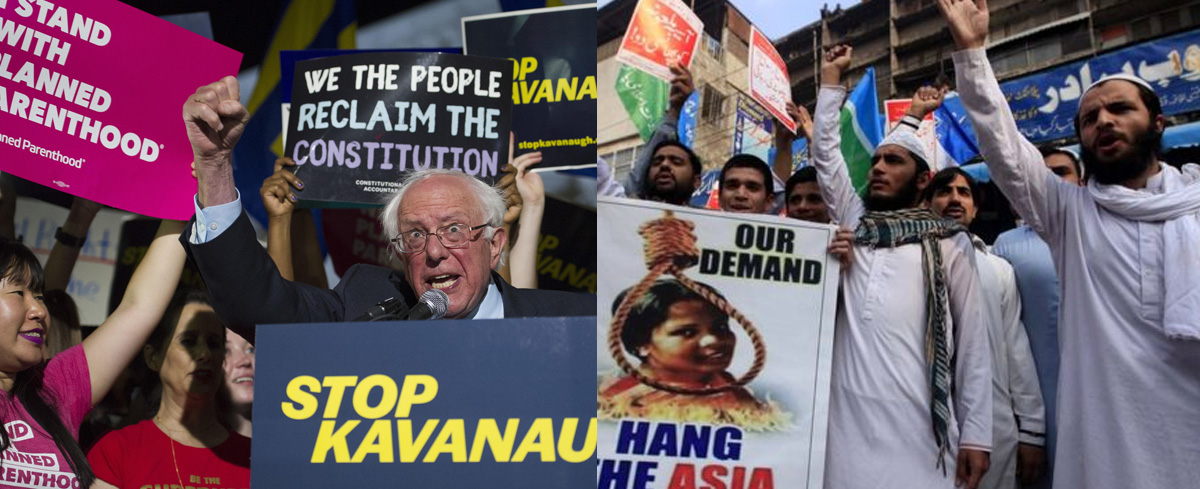There’s an eerie similarity between the protests against Asia Bibi and the protests against Brett Kavanaugh.
The tension, and rhetoric, of anti-blasphemy protesters in Pakistan, are at the same fever pitch, as anti-Kavanaugh protests were during the senate hearings, surrounding Kavanaugh’s supreme court nomination (and subsequent confirmation) in the United States.
Placards brandished about during the Ford-Kavanaugh debate which labeled Kavanaugh a rapist (without evidence or a judicial trial), have much of the same intensity as the placards brandished about by Islamist protestors in Pakistan.
For evidence of this, see the long list of celebrity outrage expressed online against the Kavanaugh confirmation.
With this #KavanaughConfirmation the Supreme Court is no longer the highest court in the land but lowest court! Tarnished for good!
— John Leguizamo (@JohnLeguizamo) September 28, 2018
We #BelieveSurvivors and refuse to accept Brett Kavanaugh as our next Supreme Court Justice. Join us in making our voices heard Friday at noon local time. Find or host an event near you: https://t.co/Lwsor1X4yW
— Amy Schumer (@amyschumer) September 28, 2018
In a similar vein, after Asia Bibi’s acquittal, Islamist protestors took to the streets in order to demand that Asia Bibi’s death sentence be carried out. This is despite a court acquitting Asia Bibi, because the evidence was inconsistent and contradictory.
Protests against the acquittal of Asia Bibi on the 1st November have only increased, with the Pakistan Government being strong-armed into keeping to its promise to uphold blasphemy laws.
Imran Khan, (now) Prime Minister of Pakistan, made the promise in July before a group of Islamic leaders in Islamabad, where he went on record promising that his party will: “stand with Article 295c and defend it”.
According to The Guardian’s, Memphis Barker, Article 295c is a “clause of the constitution that mandates the death penalty for any “imputation, insinuation or innuendo” against the prophet Muhammad.”
Asia Bibi, a Christian, fell victim to this law. In 2009, while picking fruit she was in involved in a disagreement about a bucket of water with two sisters, “who said that because Bibi had used a cup, they could no longer touch it, as her faith had made it unclean. Bibi was then accused of making three offensive comments about the Prophet Muhammad after the women said that Asia Bibi should convert to Islam. She was later beaten up at her home, during which her accusers say she confessed to blasphemy.” (The BBC)
Not only is there an eerie similarity between the two sets of protests and reactions, but each case has a list of obvious parallels.
For example:
Both have faced accusations from dubious witnesses with a potential motive for making a false accusation.
Both Bibi and Kavanaugh’s family have suffered because of those accusations.
Both Bibi and Kavanaugh are Christians.
Both are being protested after their acquittal.
Both live in nations that claim to be Democratic Republics, who uphold the right of due process (benefit of the doubt/innocent until proven guilty).
Even the differences between Asia Bibi’s case and Brett Kavanaugh’s merge at certain points.
For instance:
Bibi faced a judicial trial, and has, based on spurious evidence, served an 8 year sentence for blasphemy against Islam. Now, after her acquittal, there are ongoing protests calling for her execution.
Kavanaugh faced a virtual people’s court, and on zero evidence, was deemed guilty, by verdict of those protesting his candidacy to be a United States Supreme Court judge.
Where no comparison between the two cases can be found, is in Asia Bibi’s imprisonment, the travel ban imposed on her, and that Bibi lives in Muslim majority country, on a different continent.
In both groups of protesters, concern for the just workings of the rule of law is absent. Protests because a Christian woman wasn’t executed, based on trumped up accusations, directly reflects the Ford vs. Kavanaugh lynch mobs who were demanding Kavanaugh’s head, without granting him due process.
Any removal, or denial of due process, would easily lead to the same thing happening to habeas corpus. Conclusions based on raw emotions about accusations, without any regard for evidence is regressive.
#FREEASIABIBI





















